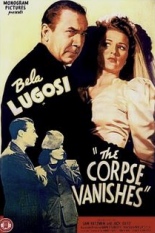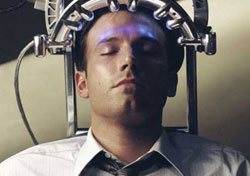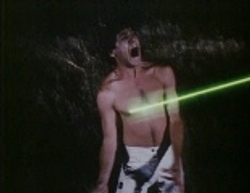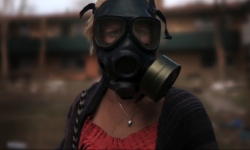
 As fun as Marvel’s big-screen Thor is, you can always rely on The Asylum to make a movie that’s more fun, even if only in terms of sheer cinematic insanity. For a few years now, these straight-to-video kingpins have been churning out “mockbusters,” suspiciously similar, low-budget rip-offs (for lack of a better word) of current blockbuster theatrical releases. Did you like Transformers? You’ll love Transmorphers! Did Paranormal Activity give you the shivers? Paranormal Entity will make you crap your pants!
As fun as Marvel’s big-screen Thor is, you can always rely on The Asylum to make a movie that’s more fun, even if only in terms of sheer cinematic insanity. For a few years now, these straight-to-video kingpins have been churning out “mockbusters,” suspiciously similar, low-budget rip-offs (for lack of a better word) of current blockbuster theatrical releases. Did you like Transformers? You’ll love Transmorphers! Did Paranormal Activity give you the shivers? Paranormal Entity will make you crap your pants!
Almighty Thor, a mind-numbingly loco version of the classic Norse myths, features a pale, menacing Richard Grieco as Loki, and in the world’s biggest middle finger to classically trained actors like Anthony Hopkins, former wrestler Kevin Nash as Odin. The Thor depicted here is far from Chris Hemsworth’s muscle-bound hero; instead he’s a whiny, petulant, wannabe warrior prone to crying jags. Lots of them. Every time anything goes the slightest bit wrong, Thor starts to weep and emote and hang his head low, usually forcing the bo staff-flinging Jarnsaxa (Patricia Velasquez) to take up the slack and dispatch of whatever CGI baddies come their way.
 Loki escapes from Hell with a handful of dragon dogs and heads up to Asgard, which, awesomely enough, looks a lot like the lush forests of Southern California. He wants the Hammer of Invincibility — basically a sharp rock tied to a stick — so he can rule the world, or at least a cost-effective portion of it. Odin gets his ass slayed, and the Hammer is sent to another dimension. Thor must man up and find the Hammer in modern-day California alleyways. He’s taught how to use a Uzi and … well, that’s something I’ve always wanted to see my entire life. God bless you, The Asylum. Monsters attack the city, Thor forges a new Hammer, and Grieco gets to eat for another week.
Loki escapes from Hell with a handful of dragon dogs and heads up to Asgard, which, awesomely enough, looks a lot like the lush forests of Southern California. He wants the Hammer of Invincibility — basically a sharp rock tied to a stick — so he can rule the world, or at least a cost-effective portion of it. Odin gets his ass slayed, and the Hammer is sent to another dimension. Thor must man up and find the Hammer in modern-day California alleyways. He’s taught how to use a Uzi and … well, that’s something I’ve always wanted to see my entire life. God bless you, The Asylum. Monsters attack the city, Thor forges a new Hammer, and Grieco gets to eat for another week.
Cody Deal manages to be the greatest and worst Thor of all-time, giving such an emotionally chaotic performance that it should be studied by drama students for years. Then again, you need such a stirring performance for a movie that plays like a pre-teen’s creative writing assignment, a piece of Thor fan fiction that is so wildly creative and tonally manic that, if given to a school counselor to read, the kid surely would be prescribed some sort of ADHD drug.
Oh, yeah: It’s directed by Christopher Douglas-Olen Ray, son of legendary B-movie director Fred Olen Ray. There’s gotta be something in the genes, because dude’s every bit the mad genius his dad is. Maybe together they can make their own mockbuster superhero crossover? I look forward to seeing Metal-Head, Gamma-Beast, Sgt. Patriot and the Almighty Thor coming together in Vindicator Force 3000. Don’t let me down, The Asylum! —Louis Fowler



 It’s not a terrible idea for a film, but director John Woo and company have steered it down that road. Woo’s Asian sensibilities simply do not translate well to American film; his direction is needlessly showy, making for choppy editing, awkward pacing and poor performances. Plus, when he manages — even in a sci-fi thriller — to throw a shot of his beloved white doves, I had to groan.
It’s not a terrible idea for a film, but director John Woo and company have steered it down that road. Woo’s Asian sensibilities simply do not translate well to American film; his direction is needlessly showy, making for choppy editing, awkward pacing and poor performances. Plus, when he manages — even in a sci-fi thriller — to throw a shot of his beloved white doves, I had to groan.
 Despite their noble attempts to harvest these platelets without killing their unwilling donors, many of the kids die as a result of the harsh methods employed by their chief kidnappers, two mentally deficient mechanics (Neville Brand and Aldo Ray). The fact that we don’t actually care if any of these kids survive does have a somewhat negative impact on the movie’s overall tension.
Despite their noble attempts to harvest these platelets without killing their unwilling donors, many of the kids die as a result of the harsh methods employed by their chief kidnappers, two mentally deficient mechanics (Neville Brand and Aldo Ray). The fact that we don’t actually care if any of these kids survive does have a somewhat negative impact on the movie’s overall tension.
 This is a great idea — the chance for an Americanized
This is a great idea — the chance for an Americanized